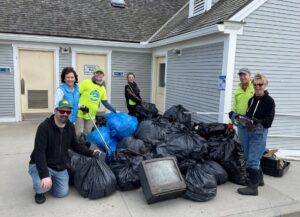 HYANNIS – If you are one of the approximately 795,000 people in the U.S. who have suffered a stroke this year, you and your family members understand how it can turn your life upside down.
HYANNIS – If you are one of the approximately 795,000 people in the U.S. who have suffered a stroke this year, you and your family members understand how it can turn your life upside down.
“A stroke is not just something the patient is going through; the whole family has had their lives changed,” said Lauren McCallum, MS, CCC-SLP, Rehabilitation Operations Manager for the Visiting Nurse Association of Cape Cod (VNA).
Once the initial crisis has passed and you are out of the hospital, going forward with your life may seem like a daunting task. You and your family members, along with your doctor, must decide whether your continued recovery can happen at home or whether a rehabilitation hospital or skilled nursing facility is your next step.
“When patients are discharged from the hospital, the severity of the stroke is one of the determining factors of whether or not they go to a facility or home for rehabilitation,” said McCallum.
“The majority of patients want to go home,” she said. “If they are capable of going home and have the support, they may go directly home with VNA services or to a family member’s home until they are able to live safely on their own.”
The day of discharge from the hospital arrives and you head home, possibly facing new challenges in your everyday routine because of deficits from the stroke. While your family or caregiver has made preparations for your homecoming, your work is just beginning.
It will start with an initial visit by a registered nurse, physical therapist, or speech-language pathologist who will begin the assessment process to establish your needs.
“We do an in-home assessment of our patients needs and then collaborate with the patient and family regarding the best treatment plan for improving quality of life,” said McCallum.
One of the priorities of the therapists going into your home will be to make sure that it is safe for you and that you’re able to move around within it, said McCallum.
How To Prepare For a Return Home
The VNA caregiver follows these tips, as outlined by the National Stroke Association:
- Check the floors for rugs, especially in hallways and stairwells. Remove any that move easily or fasten them with non-skid tape for better traction.
- Make sure there are clear paths to the kitchen, bathroom and bedroom.
- Wear non-skid shoes and avoid slick surfaces.
- Install handrails for use going up and down stairs.
When you go home, one or more members of a VNA care team will assess your needs.
Your Rehabilitation Team
- Registered Nurse: She or he will coordinate some of your services, review your medications, treatments and create a care plan.
- Physical Therapist: Assesses your ability to walk, your gait, transfers from wheelchair to bed, toilet or car, and balance. He or she will develop a plan to strengthen your muscles to help with standing, balance and movement.
- Occupational Therapist: Works with you on activities of daily living such as bathing, dressing, cooking, eating and writing. They will help the home health aide decide the best way to bathe you safely.
- Speech-Language Pathologists: Help you to communicate effectively with your family and others in your community if you have a speech or language impairment; this could affect your reading and writing as well. If communicating is difficult, the therapist will show you and your caregivers how to communicate. At times, swallowing can be impaired as well and the speech-language pathologist can help you with food preparation and safe swallowing strategies in your home so you can eat your meals safely.
- Medical Social Worker: Helps you and your family with the coping of your diagnosis and after effects. They also help with insurance, arrangements to go home or a facility, and any other support services you may need.
- Home Health Aide: Help you bathe, dress, move around safely and assist you with eating if necessary.
- Homemaker: Can clean your house, do the laundry, make meals, go grocery shopping and pick up prescriptions.
- Primary Care Physician and Neurologist: Follow up with you during and after rehabilitation.
McCallum encourages patients, families and caregivers to ask questions and express concerns about therapies and care plans.
“It’s making sure both medical professionals and our patients and their family members are on the same page with the plan of care and it’s something our VNA staff strive for so our patients can live happily for the rest of their lives,” said McCallum.























